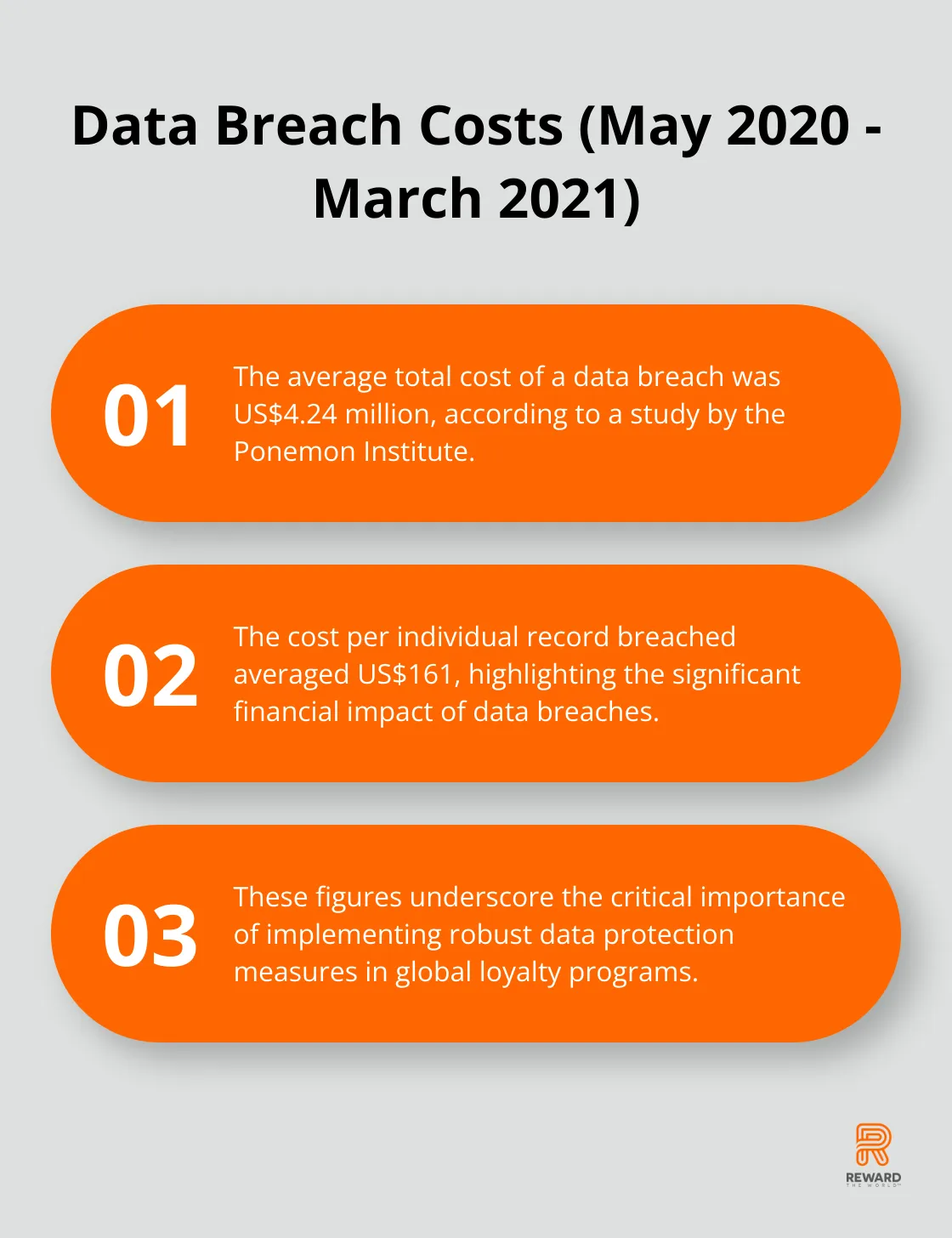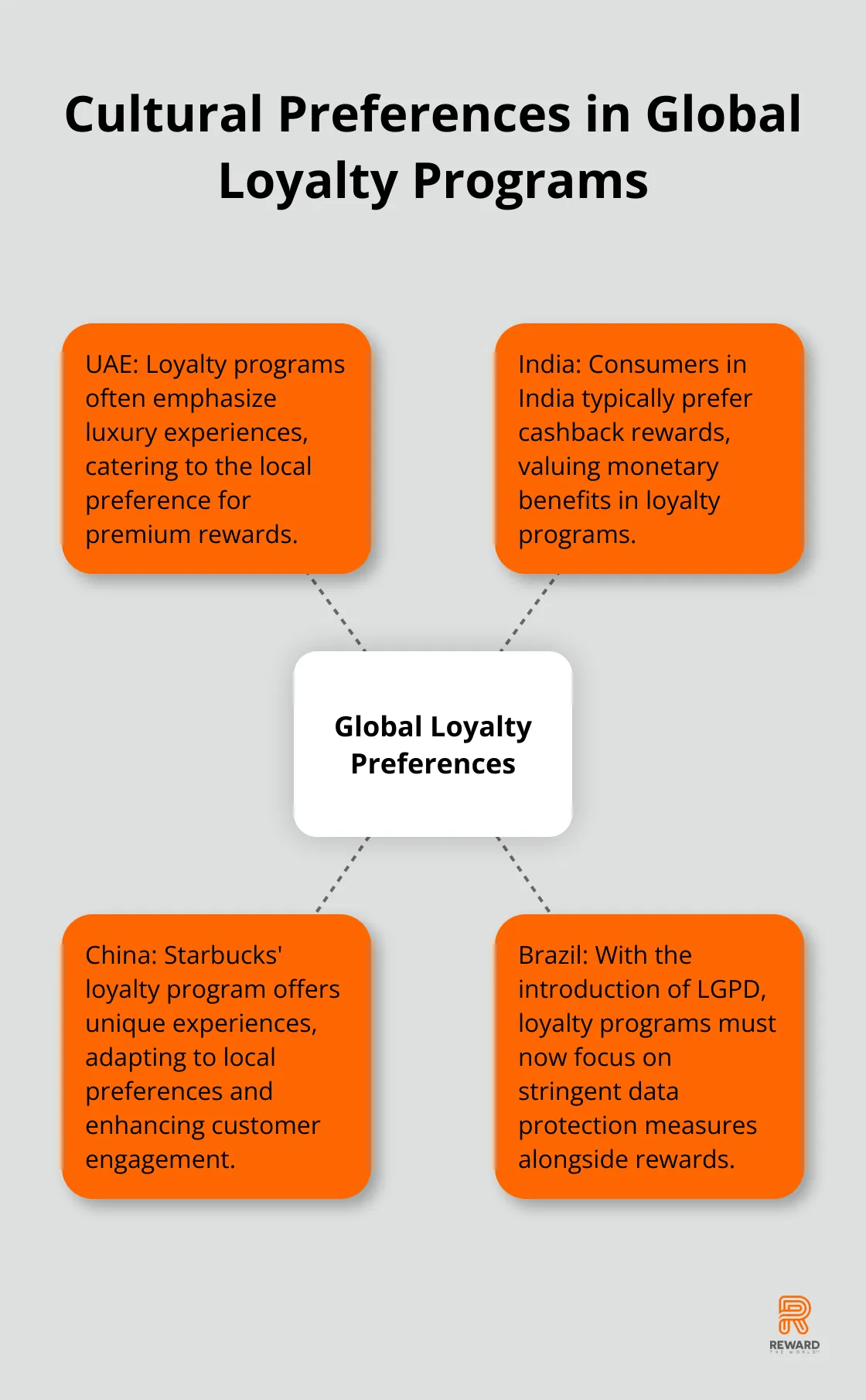
Global loyalty programs offer immense potential, but they come with a complex web of legal challenges. At Reward the World, we’ve seen firsthand how navigating these legal intricacies can make or break international incentive strategies.
Incentive compliance is a critical aspect that businesses must master to succeed in the global marketplace. This post explores the key legal considerations, challenges, and best practices for implementing loyalty programs across borders.
Legal Essentials for Global Loyalty Programs
Global loyalty programs face a complex legal landscape. Let’s explore the key legal considerations that can make or break your international incentive strategy.
Data Protection: A Global Concern
Data protection laws vary widely across countries. The General Data Protection Regulation (GDPR) requires loyalty program providers to be transparent about how their program processes customer data, imposing harsh fines for those who violate its provisions. In the US, laws like the California Consumer Privacy Act (CCPA) add another layer of complexity.
To navigate this, businesses must:
- Implement robust data encryption
- Update privacy policies regularly
- Provide clear opt-in and opt-out mechanisms
A study by the Ponemon Institute found that the average cost of a data breach from May 2020 to March 2021 was US$4.24 million, or US$161 per record. This underscores the importance of strong data protection measures.

Consumer Protection: Building Trust
Consumer protection laws shield customers from unfair practices. These laws often require clear terms and conditions, fair pricing, and truthful advertising.
In the UK, the Consumer Rights Act 2015 gives customers the right to return faulty goods within 30 days. In Australia, the Australian Consumer Law provides similar protections.
To ensure compliance:
- Communicate reward terms clearly
- Avoid misleading promotions
- Provide easy-to-understand program rules
Tax Implications: A Hidden Minefield
Loyalty programs can have significant tax implications. In some countries, rewards may count as taxable income. In the US, the IRS generally views frequent flyer miles as non-taxable. However, cash rewards often are taxable.
Businesses should:
- Consult with tax experts in each market
- Communicate any tax obligations to members clearly
- Keep detailed records of rewards distributed
Anti-Money Laundering: Staying Vigilant
Anti-Money Laundering (AML) laws prevent criminal activities. Loyalty programs (especially those involving cash rewards) can be targets for money laundering.
The Financial Action Task Force (FATF) provides guidelines for AML compliance. These include customer due diligence and reporting suspicious transactions.
To mitigate risks:
- Implement strong identity verification processes
- Set limits on reward redemptions
- Monitor for unusual activity patterns
The Road Ahead: Compliance and Innovation
As we move forward, the legal landscape for global loyalty programs will continue to evolve. Businesses must stay agile, adapting to new regulations while innovating their reward strategies. The next section will explore the specific challenges that arise when implementing loyalty programs across international borders.
Overcoming Global Loyalty Program Hurdles
Regulatory Maze Navigation
Each country presents a unique set of rules for loyalty programs. The EU enforces strict data protection standards through GDPR. The US operates with a patchwork of state-level regulations (e.g., CCPA in California). Japan’s Act on the Protection of Personal Information (APPI) adds complexity for businesses in Asia.
To address this challenge, businesses should create a compliance matrix for each target market. This matrix should outline key regulations, required disclosures, and potential penalties. Regular updates are essential, as laws can change rapidly. For example, Brazil’s General Data Protection Law (LGPD) took effect in 2020, surprising many international businesses.
Cultural Barrier Breakthrough
What succeeds in one market may fail in another. UAE loyalty programs often emphasize luxury experiences, while Indian consumers prefer cashback rewards. Understanding these nuances is vital for success.
Thorough market research should precede any new country launch. This research should include focus groups with local consumers to assess their preferences. Businesses must adapt their reward offerings accordingly. Starbucks’ loyalty program in China, for instance, offers unique experiences to deepen customer loyalty and deliver an exceptional customer experience.

Financial Complexity Tackling
Currency fluctuations can disrupt international loyalty programs. A $10 reward today might cost $12 tomorrow, potentially eroding profit margins. Some countries also impose strict regulations on cross-border money movements.
To mitigate these risks, businesses can use a points-based system not directly tied to a specific currency. This approach allows more flexibility in reward valuation. Partnerships with local financial institutions can help navigate country-specific regulations. In China, for example, collaborating with Alipay or WeChat Pay can simplify transactions and enhance user experience.
Operational Challenges Management
Managing a global loyalty program involves complex logistics. Reward fulfillment across borders can lead to delays and increased costs. Different time zones and languages can complicate customer support.
To address these issues, businesses should:
- Establish regional fulfillment centers
- Implement a robust, multilingual customer support system
- Use AI-powered chatbots for 24/7 assistance (while maintaining human oversight)
Technology Integration Across Borders
Different countries often use varied technology infrastructures. This disparity can complicate the implementation of a unified loyalty platform.
Businesses should:
- Develop a flexible, cloud-based system that can adapt to different technological environments
- Ensure mobile compatibility (as mobile usage rates vary significantly across countries)
- Implement strong cybersecurity measures to protect data across all markets
These challenges underscore the complexity of global loyalty programs. However, with careful planning and strategic execution, businesses can transform these hurdles into opportunities for growth and innovation. The next section will explore best practices for ensuring legal compliance in global loyalty programs, a critical aspect of successful international expansion.
How to Ensure Legal Compliance in Global Loyalty Programs
Conduct Comprehensive Legal Research
Before launching a loyalty program in a new market, businesses must perform thorough legal research. This involves creating a detailed compliance checklist for each target market, covering areas such as data protection, consumer rights, tax implications, and financial regulations.
For example, companies expanding into Brazil must understand the Lei Geral de Proteção de Dados (LGPD), which is Brazil’s data protection law. While it shares common principles and aims of safeguarding data with the GDPR, it has unique provisions that require specific compliance measures.
Implement Strong Data Protection Measures
Data protection is a top priority for global loyalty programs. Companies must implement strong encryption, regular security audits, and strict access controls for all stored customer data. This includes industry-standard protocols for data at rest and in transit.
Companies should adopt a data minimization strategy, collecting only essential information for program operation. This approach reduces risk and simplifies compliance with various data protection laws worldwide.
Ensure Clear Program Terms
Clear, concise, and easily accessible terms and conditions are vital for legal compliance and customer trust. Companies should avoid legal jargon and provide translations in local languages. In the EU, the Unfair Commercial Practices Directive incorporates the right of consumers to proportionate and effective individual remedies when they are harmed by unfair commercial practices.
Creating a simplified version of terms alongside the full legal document can increase user engagement. Some companies (like Airbnb) have seen user engagement with terms increase by up to 35% using this approach.

Perform Regular Compliance Audits
The legal landscape evolves constantly. Regular audits help ensure loyalty programs remain compliant across all markets. Companies should conduct quarterly internal reviews and annual external audits by legal experts.
These audits should cover all aspects of the program, from data handling practices to reward fulfillment processes.
Partner with Local Legal Experts
While global legal counsel provides value, partnering with local experts in each market is essential. These experts offer insights into nuanced local regulations and cultural considerations that international firms might overlook.
Local partnerships can help navigate complex regulations like Japan’s Act on the Protection of Personal Information (APPI), ensuring full compliance in each market.
Final Thoughts
Global loyalty programs offer great potential for businesses to expand their reach and engage customers across borders. These programs require careful navigation through a complex web of legal considerations, including data protection, consumer protection, tax implications, and anti-money laundering compliance. Businesses must adopt proactive strategies to maintain incentive compliance in this multifaceted and evolving legal landscape.
The challenges in implementing international loyalty programs are significant but also present opportunities for innovation and growth. Varying regulations, cultural barriers, currency issues, and operational complexities contribute to the intricate nature of global incentive strategies. Companies must conduct thorough legal research, implement robust data protection measures, ensure transparent terms, perform regular audits, and partner with local experts to succeed.
At Reward the World, we understand the complexities of global loyalty programs and offer solutions for businesses aiming to foster customer loyalty while ensuring compliance across multiple jurisdictions. Our platform provides instant reward delivery, multilingual support, and robust analytics to help businesses elevate their customer engagement strategies. The key to success in global loyalty programs lies in striking the right balance between innovation and incentive compliance.
